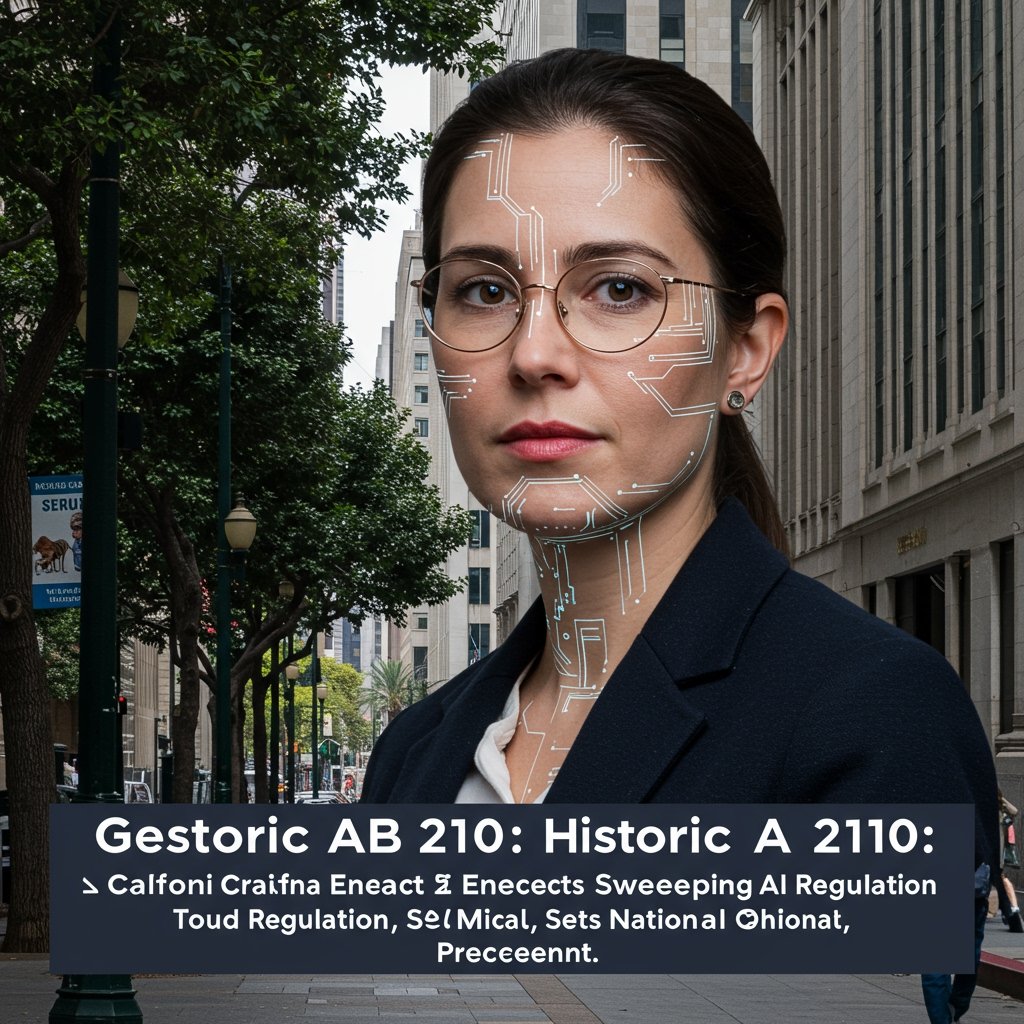California Governor Signs Landmark AI Regulation Bill into Law
Sacramento, CA – In a move poised to position California as a national leader in the governance of artificial intelligence, Governor Gavin Newsom on March 4, 2025, officially signed Assembly Bill 210 (AB 210) into law. This landmark legislation establishes the state’s first comprehensive framework for regulating AI, addressing critical aspects such as transparency, safety, and oversight in an rapidly evolving technological landscape.
The signing ceremony, held in Sacramento, marked a significant milestone in the state’s effort to proactively address the potential societal impacts of AI technologies. AB 210 represents a culmination of extensive legislative debate, stakeholder input, and a growing recognition among policymakers of the urgent need for clear guidelines as AI applications become more ubiquitous and sophisticated.
The Need for Regulation
The rapid advancement and deployment of artificial intelligence across various sectors – from healthcare and finance to transportation and communication – have brought about transformative benefits but also raised profound questions regarding ethics, bias, accountability, and potential risks. While proponents highlight AI’s potential to drive economic growth and solve complex problems, concerns have mounted over issues like algorithmic discrimination, job displacement, privacy invasion, and the potential for autonomous systems to cause harm if not properly controlled.
Legislators and consumer advocates have argued that without a clear regulatory structure, the risks associated with AI could undermine public trust and safety. AB 210 is intended to provide a foundational layer of governance to mitigate these risks while aiming to foster responsible innovation. The bill’s proponents emphasized the need to ensure that AI development and deployment align with public interest and democratic values.
Key Provisions of AB 210
Assembly Bill 210 introduces several key mandates designed to bring structure and accountability to the AI ecosystem in California. One of the central pillars of the new law is the requirement for increased transparency for AI-generated content. This provision aims to help individuals distinguish between content created by humans and that produced by AI systems, addressing concerns related to deepfakes, misinformation, and the authenticity of digital information. The specifics of how this transparency must be implemented, such as labeling or disclosure requirements, will likely be further defined through subsequent regulatory processes.
In addition to transparency, AB 210 sets forth safety standards for applications deemed high-risk. The law acknowledges that certain uses of AI carry a higher potential for causing significant harm, such as those in critical infrastructure, medical diagnostics, or hiring processes. For these designated high-risk applications, developers and deployers will be required to adhere to specific safety protocols, testing procedures, and risk assessments to minimize potential negative consequences. The bill provides a framework for identifying what constitutes ‘high-risk’ AI and the level of scrutiny required for such systems.
Furthermore, the legislation creates a new state council to oversee AI development and deployment within California. This council is envisioned as a central body responsible for monitoring the AI landscape, advising the legislature and state agencies on emerging issues, coordinating regulatory efforts across different sectors, and potentially developing guidelines and best practices. The formation of this council signifies the state’s commitment to ongoing vigilance and adaptive governance as AI technology continues to evolve.
Industry Reactions
The passage of AB 210 has elicited varied responses from stakeholders across the state. Tech industry groups, such as the California Tech Association, have publicly expressed concerns about potential innovation impacts. Their arguments often center on the possibility that stringent regulations could stifle the rapid pace of development characteristic of the tech sector. Concerns include the administrative burden of compliance, the potential for regulations to become quickly outdated due to technological advancements, and the risk that overly prescriptive rules could disadvantage California-based companies compared to those operating in jurisdictions with fewer restrictions.
The California Tech Association noted in statements that while they support responsible AI development, they believe the specific mandates within AB 210 could impose significant costs and create uncertainty that might hinder investment and research in the state. They advocate for a regulatory approach that is flexible, pro-innovation, and harmonized with national or international standards where possible.
Advocate Perspectives
In contrast, consumer advocates lauded the move as essential for public protection and accountability. Organizations representing consumer interests have been vocal proponents of AI regulation, arguing that the potential benefits of AI must not come at the expense of fundamental rights and safety. They view AB 210 as a crucial step towards ensuring that AI systems are developed and deployed ethically, transparently, and responsibly.
Advocates emphasize that mandates like transparency for AI-generated content and safety standards for high-risk applications are necessary safeguards against potential misuse, bias, and harm. They believe the creation of a state oversight council is vital for ensuring continuous monitoring and the ability to adapt regulations as AI technology advances. From their perspective, the bill prioritizes the well-being and trust of California residents in an era increasingly defined by artificial intelligence.
California’s National Role
With the signing of AB 210, California is decisively positioning itself as a national leader in AI governance. As the most populous state and a global hub for technological innovation, California’s regulatory decisions often have a ripple effect across the United States and internationally. By enacting a comprehensive framework now, California is setting a precedent that may influence how other states and potentially the federal government approach AI regulation.
The law’s effective date of January 1, 2026, provides a transition period for companies and the state to prepare for the implementation of the new rules. During this time, state agencies and the newly formed AI council will likely work on developing specific regulations and guidance to enforce the provisions of AB 210.
Governor Newsom’s signing of this bill underscores a commitment to navigating the complex challenges presented by artificial intelligence, balancing the pursuit of innovation with the imperative of public safety and ethical deployment. The coming months leading up to the effective date will be critical for stakeholders to understand the full implications of this landmark legislation and for the state to establish the mechanisms necessary for its effective implementation.


















